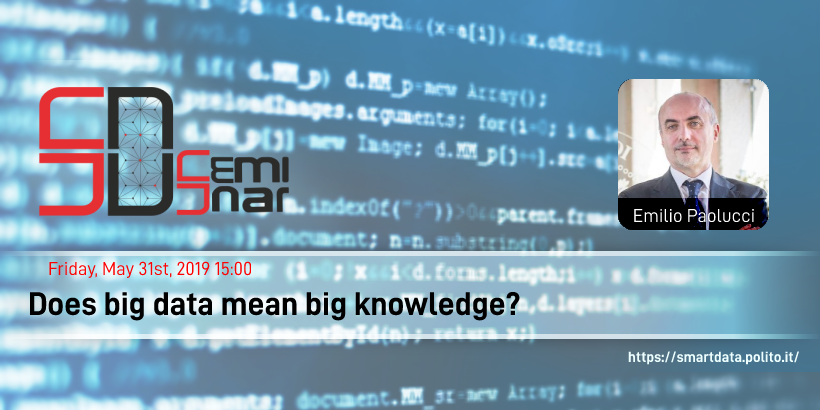
Presenter: Emilio Paolucci (Politecnico di Torino)
Friday, May 31st, 2019 15:00
Location: Maxwell Room 5th Floor DET – Corso Castelfidardo, 42/a
Abstract
Today, digitization and big data analytics penetrate all areas of life and create new ways of working, communicating and cooperating. Connecting individuals, enterprises, devices and governments enables easier transactions, collaboration and social interaction and results in enormous accessible data sources. Not only do physical world turns into ‘‘walking data generators” but, in addition, the interaction between objects – the so-called Internet of Things – adds a multitude of data sources throughout organizations and society. In many contexts, new entrants – such as Google, Airbnb and specialized platforms that offer automation consulting and data analytics in the manufacturing sector (e.g., Predix) – have launched product and service innovations that have redefined industries by leveraging big data and digital technologies.
While these success stories are exemplary, on the flipside, a much larger number of incumbents struggles to reconfigure their innovation activities in light of the significant changes brought about data-rich and digital-connected environments. On one hand, in data-rich environments newcomers are radically reshaping competition trying to use data to intermediate and extract profits from traditional sectors and legacy companies. On the other, the fast and inertial changes in digital-connected environments clash with the “non-digital” legacy of structures, cultures, roles, processes, and skills that characterize established organizations and underpin the entire innovation process. Understanding these factors is particularly important to tackle (and to lead) digital transformation, given the strong interdependence between the organizational contexts, digital technologies and the structure of industrial sectors.
In the seminar will discuss how firms should look at their products and skill sets to combine different innovation regimes and take advantages from the digitization and datification processes. In doing so, incumbent firms have to focus their efforts not only on data management and analytics technologies but also on an increasing number of organizational enablers including work practices (e.g., exploration and exploitation) and the right balance between digital and legacy capabilities. In turn, this calls for new forms of governance of knowledge and information, new business models, new organizational architectures, encouraging new “uncoordinated” forms of exploring (i.e., searching) and exploiting (i.e., recombining) different innovation regimes. Positive and negative effects of the digitization process on the global economy will be discussed and policy implications for research and innovation will be outlined.
Bio
Emilio Paolucci teaches courses in Strategy and Entrepreneurship. He is responsible of the EIC – Entrepreneurship and Innovation Center – at Politecnico di Torino and of the CLab project funded by MIUR (CLabs are places where the culture of entrepreneurship and innovation is emphasized, and they aim at promoting interdisciplinarity, new learning models).
His research topics concern the digital transformation of information intensive sectors, the relationship between the organization of work and the effects of digital technologies in the manufacturing and service sectors, the role of university Technology Transfer in the development of ecosystems and of their capacity of innovation, and the interplay of innovation and internationalization processes in SMEs.
Download:
